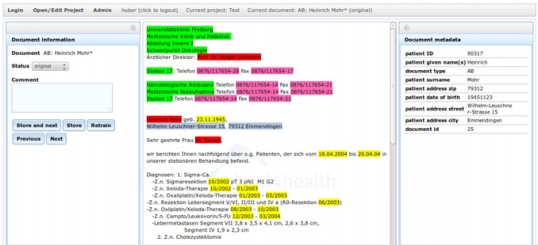ANONYMIZATION / DE-IDENTIFICATION
OF MEDICAL DOCUMENTS
Sensitive patient information remains protected and finds data protection-friendly application in clinical studies, quality assurance and medical research.

The furnishing of clinical raw data is an indispensible basis for numerous applications in medical research. Aggregated patient data can contribute greatly to the identification of illness mechanisms.
Patient recruiting times in clinical studies is significantly reduced and the controlling of medication safety improved by means of continual monitoring. Plausibility checks of physician practices are efficient and can be carried out at low cost.
ANONYMIZATION / DEIDENTIFICATION OF MEDICAL DOCUMENTS – WHY?
Medical data is extremely vulnerable and is subject to strict data protection regulations. All personal information must be removed before the data can be released for medical research and Healthcare.
Aside from personal names and dates of birth, protection-worthy information also includes telephone numbers, names of doctors and relatives, as well as many further text passages. Other information such as dates should only be partially removed, but study-specifically coarsened over a period of one or several years.
EXAMPLE: ANONYMIZATION OF MEDICAL DOCUMENTS
Stadisches Krankenhaus Braunschweig
Abteilung Innere 3
Station DaVinci
Ärztlicher Direktor: Frau Prof. Marta Müller
Arztzimmer Tel. 0121/123 Fax. 0121/7223
Buxtehude, den 17. März 2015
Unsere Zeichen: bk/ij
Herrn
Dr. med Martin Müller
Willy-Brandt-Allee 12
01292 Berlin
Betrifft Patientin Luise Kisselbach, geb. 17.07.1921
Sehr geehrter Kollege Müller,
wir berichten Ihnen nachfolgend über o.g. Patientin, die sich am 21.04.2003 in unserer Behandlung befand...
Stadisches Krankenhaus Braunschweig
Abteilung Innere 3
Station DaVinci
Ärztlicher Direktor: Frau Prof. Marta Müller
Arztzimmer Tel. 0121/123 Fax. 0121/7223
Buxtehude, den 17. März 2015
Unsere Zeichen: bk/ij
Herrn
Dr. med Martin Müller
Willy-Brandt-Allee 12
01292 Berlin
Betrifft Patientin Luise Kisselbach, geb. 17.07.1921
Sehr geehrter Kollege Müller,
wir berichten Ihnen nachfolgend über o.g. Patientin, die sich am 21.04.2003 in unserer Behandlung befand...
When anonymization / de-identification critical information is first identified and technically highlighted. These personal details will be deleted so that no connection to the patient or to the treatment can be made.
Left you see schematically and exemplified the method of anonymization of medical data. Try it!
THE SOFTWARE FOR ANONYMIZATION AND DE-IDENTIFICATION FROM AVERBIS
Averbis DeID supports you in identifying sensitive data in medical free texts. Intelligent processes take over the marking of relevant passages, various algorithms offering the greatest possible protection, as scientific studies prove:
- Metadata transmitted separately by HL7 such as patient name, address and date of birth are identified reliably in the free texts.
- Muster-based processes recognize structured information such as Email addresses and dates
- Certain text passages can be explicitly removed or protected with positive and negative lists. Clinic-specific characteristics such as doctor and station names can be entered in the positive list. The negative list can include product names or proper names such as Parkinson’s.
- Automatic learning processes recognize names and other person-identifying characteristics not explicitly known. These include the names of relatives or registered doctors.

HIGH FLEXIBILITY
The marking of personal data and its further processing are logically separated in DeID, offering you the possibility of differentiating, study-specific treatment of certain features. You wish to establish a patient’s date of birth in one study and remove the year of birth entirely in another? You’re flexible in the selection of protection level and can guarantee the greatest level of data protection in every study.
POWERFUL INTERFACE
Users have the possibility of controlling and manually revising the automatic anonymization at any time. The interface possesses numerous mechanisms to carry out the control as comfortably and time effectively as possible, including visualization possibilities, the use of shortcuts and the minimizing of clicks. The program automatically helps you by assuming the interpretation of attributes such as recognition of day, month and year in dates.
CONCLUSION
DeID is an indispensible tool for distributed medical research. It supports the data-protection friendly handling of medical documents in clinical studies, in quality assurance and in medical research.
THE ANONYMIZING SOFTWARE FROM AVERBIS:
BENEFITS AT A GLANCE
-
- Greatest possible accuracy and reliability
- Flexibility through individual protection mechanisms
- Detailed guidelines on data protection-friendly anonymization
TECHNICAL DETAILS
-
- Various import formats (e.g. Text, Word, PDF, HL7)
- Export as HL7 message
- Platform-independent client server architecture
- Web-based graphic user interface
ABOUT THE PROJECT AND THE ANONYMIZING AND DE-IDENTIFICATION SOFTWARE FROM AVERBIS
DeID was developed in the scope of the research project cloud4health. The project is part of the TrustedCloud Program, a research project initiated by the Federal Ministry for Economics and Technology (Bundesministerium für Wirtschaft und Technologie BMWi). cloud4health uses anonymized clinical routine data of patients which contains important information for patient care. Application possibilities for clinical studies and registers emerge from the evaluation of data in the Cloud, also enabling new findings on the effect of medications. Three practical applications are being developed in cloud4health for Healthcare: a register for artificial hip joints and their durability, an automatic analysis of medical services. And an early warning system for medication safety.

